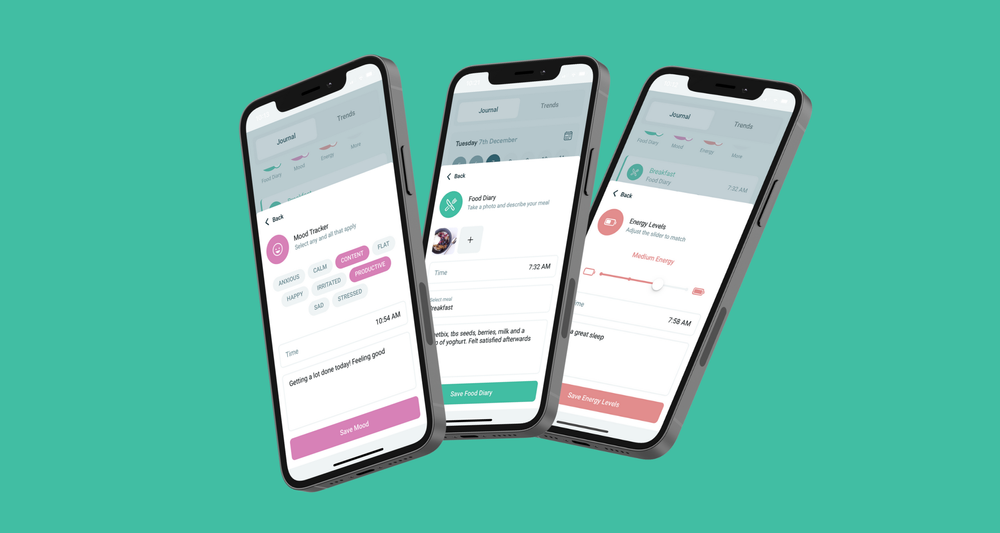The Power of Health Tracking
Regularly tracking different aspects of our health overtime is one of the most powerful ways that we can understand our own health and take informed action to reach our health goals.
With the Sophus Journal, you’re able to track different aspects of your health like the food you eat, your mood, and energy levels; with even more tracking capabilities to come.
Research studies are continuing to find the value in being able to track our health and this article will highlight the benefits and power that can come with understanding our health through tracking.
Photo Food Journaling
While meal tracking is a beneficial tool for both clients and health practitioners, many tools used for tracking are tedious and time-consuming [1]. Traditional meal trackers, whether paper based or digital, require you to record many details of your meal which can create a barrier for completing the tracking. Many of us don’t have the time to complete a detailed account for every meal everyday, and these tracking tools can also lead to inaccurate reporting of portion sizes [1].
An effective and simple alternative to this is photo food journaling. Keeping a photo food diary is a helpful way that you can identify your own eating habits and patterns; including meal regularity, portion sizes and food variety, which all play a role in healthy eating. Images of food have also been found to be appropriate for nutrition professionals such as dietitians to determine what food is in the meal, and the portions [2].
Why we don’t focus on the numbers
Research has found that number-focused journaling can pose a risk to some people’s relationship with food and mental health.
There are some select instances where number-based tracking can be helpful or even necessary when keeping a food diary, however in majority of cases, a photo food diary is an accurate tool for estimating meal nutrients and portion sizes. In the case of the Sophus photo food diary, your Sophus dietitian will be able to get a good representation of your eating patterns through photos alone - but in the case that they do need more information from you, they’ll send you a message!
Mood Tracking
Our emotional wellbeing is a key part of our mental and overall health; positive emotional states have been found to be encourage other healthy behaviours like quality sleep and exercise [3]. Tracking our mood can help maintain a healthy mindset and emotional state as well as help us understand our health and connect how we feel with other aspects of our health [3].
Research looking into people using mood tracking tools such as apps have found that these people have reported feelings of greater control of their mood, and are able to make informed decisions on how to improve aspects of their mood and emotional wellbeing [3]. Users with mental illnesses such as depression, anxiety, and bi-polar disorder find mood tracking beneficial to better manage their emotions and understand their mood patterns [3].
Energy Tracking
How we feel in terms of our physical energy levels can be impacted by a lot of factors, including the food we eat and our mood. Fatigue and low energy can be a symptom of nutrient deficiencies, poor diet, too little or too much exercise or other health factors. Tracking your energy levels along with considering other lifestyle factors like your eating habits, stress levels, and exercise can help you identify patterns in your energy levels and make informed decisions on how you may be able to improve your energy levels.
Track your food, mood and energy with the Sophus App
Why did we choose these three parameters to track?
Building a product that provides value to our users is our goal at Sophus, and to help us develop our Journal feature we spoke with a group of our users to discuss what was most important to them when it comes to tracking their health.
While we plan to give you the ability to track more aspects of your health in the future, tracking food, mood and energy levels were the top three health parameters.
As well as being popular with our users, by logging your meals and snacks along with your energy levels and mood in your Sophus journal, you’ll be able to identify possible relationships between how your food choices impact how you feel. There is a close relationship between how we feel (mood and energy) and what we eat; now with Sophus, you can visualise these patterns which can help empower you to take charge of your health and reach your goals.
References
[1] Banerjee P, Mendu VVR, Korrapati D, Gavaravarapu SM. Calorie counting smart phone apps: Effectiveness in nutritional awareness, lifestyle modification and weight management among young Indian adults. Health Informatics Journal. June 2020:816-828. doi:10.1177/1460458219852531
[2] Fatehah AA, Poh BK, Shanita SN, Wong JE. Feasibility of Reviewing Digital Food Images for Dietary Assessment among Nutrition Professionals. Nutrients. 2018;10(8):984. Published 2018 Jul 27. doi:10.3390/nu10080984
[3] Caldeira C, Chen Y, Chan L, Pham V, Chen Y, Zheng K. Mobile apps for mood tracking: an analysis of features and user reviews. AMIA Annu Symp Proc. 2018;2017:495-504. Published 2018 Apr 16.

